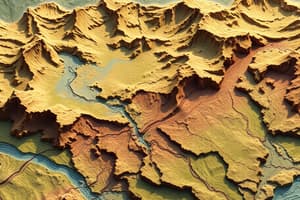Podcast
Questions and Answers
What feature is formed when a meander loop is cut off from the main river?
What feature is formed when a meander loop is cut off from the main river?
- Gorge
- Delta
- Oxbow lake (correct)
- River cliff
Which process is responsible for the removal of soil from land?
Which process is responsible for the removal of soil from land?
- Sedimentation
- Soil erosion (correct)
- Desertification
- Decomposition
What sediment formation occurs in areas with little vegetation due to wind erosion?
What sediment formation occurs in areas with little vegetation due to wind erosion?
- Alluvial fans
- Glacial till
- Barchans sand dunes (correct)
- Mudflats
What type of rock formations form as a result of wind abrasion on alternating soft and hard rock layers?
What type of rock formations form as a result of wind abrasion on alternating soft and hard rock layers?
Why is wind erosion more prevalent in areas with little vegetation?
Why is wind erosion more prevalent in areas with little vegetation?
Which of the following describes the term 'abrasion' in the context of desert erosion?
Which of the following describes the term 'abrasion' in the context of desert erosion?
What human activity is a significant contributor to soil erosion?
What human activity is a significant contributor to soil erosion?
What does the term 'gorge' refer to in geographical terms?
What does the term 'gorge' refer to in geographical terms?
What is the process of weathering primarily caused by temperature changes and frost called?
What is the process of weathering primarily caused by temperature changes and frost called?
Which type of weathering involves the action of animals and plants?
Which type of weathering involves the action of animals and plants?
What chemical reaction is primarily involved in carbonation?
What chemical reaction is primarily involved in carbonation?
Which process is characterized by the removal of the outer layer of rocks due to temperature variations?
Which process is characterized by the removal of the outer layer of rocks due to temperature variations?
In which type of weathering do rocks transform into clay as a result of water absorption?
In which type of weathering do rocks transform into clay as a result of water absorption?
What is erosion primarily concerned with?
What is erosion primarily concerned with?
Which substance forms rust when mixed with iron in rocks during oxidation?
Which substance forms rust when mixed with iron in rocks during oxidation?
Which factor is NOT a cause of physical weathering?
Which factor is NOT a cause of physical weathering?
What is one negative effect of overgrazing?
What is one negative effect of overgrazing?
Which practice specifically leads to the reduction of certain minerals like nitrogen?
Which practice specifically leads to the reduction of certain minerals like nitrogen?
What is the main effect of mining activities on the soil?
What is the main effect of mining activities on the soil?
Which of the following is NOT a type of delta?
Which of the following is NOT a type of delta?
What characterizes a braided stream?
What characterizes a braided stream?
What forms a natural levee?
What forms a natural levee?
Which type of delta is characterized by curved, arc-shaped distributaries?
Which type of delta is characterized by curved, arc-shaped distributaries?
Which of the following best describes a floodplain?
Which of the following best describes a floodplain?
What shape characterizes a cuspate delta?
What shape characterizes a cuspate delta?
What geological feature forms when hard rocks are eroded?
What geological feature forms when hard rocks are eroded?
What is formed as a direct result of wave action eroding the base of a headland?
What is formed as a direct result of wave action eroding the base of a headland?
Which process describes the movement of sediments parallel to the shore?
Which process describes the movement of sediments parallel to the shore?
What type of area is created by a mixture of river and sea water?
What type of area is created by a mixture of river and sea water?
What is a significant characteristic of a lagoon?
What is a significant characteristic of a lagoon?
What is a lateral moraine?
What is a lateral moraine?
Which of the following features is formed from glacier movement?
Which of the following features is formed from glacier movement?
What does deposition refer to in a river system?
What does deposition refer to in a river system?
Which of the following defines a tributary?
Which of the following defines a tributary?
What is a river mouth?
What is a river mouth?
What conditions are required for exfoliation to occur?
What conditions are required for exfoliation to occur?
Which of the following best describes a meander?
Which of the following best describes a meander?
What type of landform is created by the continuous retreat of a waterfall?
What type of landform is created by the continuous retreat of a waterfall?
Which term describes the point where tributaries join a larger river?
Which term describes the point where tributaries join a larger river?
What is the definition of erosion in the context of fluvial landforms?
What is the definition of erosion in the context of fluvial landforms?
Flashcards are hidden until you start studying
Study Notes
Weathering
- Weathering is the breakdown of rocks and soil caused by water, wind, temperature changes, and biological factors.
- Three main types of weathering: Physical, Chemical, Biological.
Physical Weathering
- Freeze and Thaw: Water expands when frozen, leading to rock fragmentation.
- Exfoliation: Outer rock layers peel away due to temperature fluctuations causing expansion and contraction.
Chemical Weathering
- Carbonation: Carbon dioxide in water forms carbonic acid, which dissolves rocks like limestone and dolomite.
- Oxidation: Iron-containing rocks react with oxygen, leading to rust formation.
- Hydrolysis: Hard rocks, such as granite, absorb water and convert to clay, facilitating weathering.
Biological Weathering
- Plant growth and animal activities (e.g., burrowing by worms and moles) expose rocks to weathering.
- Lichens produce acids that chemically weaken rocks.
Erosion and Deposition
- Erosion involves the removal of weathered material by water, wind, or animals.
- Deposition refers to the accumulation of this material in new locations.
River Systems
- Source: The origin of a river.
- Tributaries: Smaller streams that feed into a larger river.
- Confluence: The junction where tributaries meet.
- River Mouth: The endpoint of a river where it meets a larger body of water.
- Interfluve: High land between rivers and tributaries.
Fluvial Landforms
- Formed through erosion and deposition by river flow:
- Rapids, Waterfalls, Meanders, Oxbow Lakes, Braided Streams, Flood Plains, Natural Levees.
Meanders
- Bends in rivers happen when water erodes one bank while depositing sediment on the opposite side, forming river cliffs and inside bends.
Oxbow Lakes
- Formed when a meander loop is cut off from the main river body.
Desert Erosion and Deposition
- Abrasion: Scraping away of material, common in low-vegetation areas.
- Erosional features include Mushroom Rocks and Yardangs.
- Depositional features include Barchan Sand Dunes, Sief Dunes, and Transverse Dunes.
Impact of Human Activities on Soil
- Deforestation, agriculture, construction, desertification, and mining significantly disturb soil, leading to erosion.
- Overgrazing jeopardizes the stability of soil structures.
- Monoculture farming depletes vital minerals, unlike crop rotation which maintains soil health.
River Depositional Features
- Braided Streams: Characterized by intertwining shallow channels.
- Flood Plains: Level areas alongside rivers formed by sediment deposits during floods.
- Natural Levees: Raised banks formed by sediment buildup after repeated flooding.
- Deltas: Formed where a river enters a larger body of water, resulting in branched distributaries.
Types of Deltas
- Arcuate Delta: Curved, arc-shaped channels (e.g., Okavango Delta, Niger Delta).
- Bird’s Foot Delta: Shaped like a bird’s claws.
- Estuarine Delta: Wide, shallow river mouth.
- Cuspate Delta: Triangular shape with few distributaries.
Coastal Erosion
- Hard rocks form headlands; softer rocks erode into bays.
- Erosion due to wave action can create caves, arches, stacks, and stumps.
Glaciation
- Glaciation is the movement of ice downhill due to gravity, producing features such as moraines and eskers.
- Lateral Moraines: Rock deposits on valley sides.
- Terminal Moraines: Deposits at the valley's end.
- Eskers: Ridges formed in glacial channels.
Studying That Suits You
Use AI to generate personalized quizzes and flashcards to suit your learning preferences.




